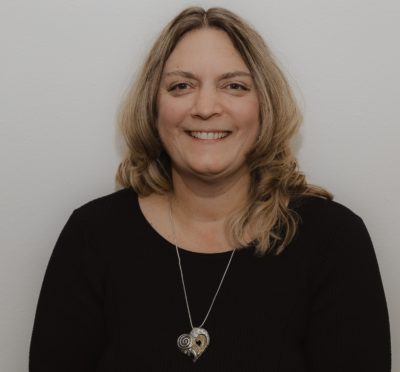Who is Amy?
Amy’s journey, both professionally and personally, be gan 30-plus years ago at Illinois State University in Normal, Illinois. As a special educator for the past 27 years, she has spent her career helping students create a “clean slate” approach to their behaviors so they can be successful in the classroom setting. During her career, she has worked in various settings, including developmental preschool, middle school (resource person), and high school (lead special educator). Currently, she is the program facilitator for a day treatment program in Northern Illinois. Amy serves the needs of students with emotional disabilities, ages 7 to 19, who have struggled in their home school environments. During her 15 years with the program, Amy’s staff have created a trauma-sensitive environment where every staff member understands that behavior is communication. She has spent the last several years training staff throughout Illinois using a program developed alongside her social worker friend; the program is called Cool, Calm and Collected: Real Life Strategies for Managing Behaviors in the Classroom. In addition, they have developed trauma and resiliency trainings used throughout their cooperative.
gan 30-plus years ago at Illinois State University in Normal, Illinois. As a special educator for the past 27 years, she has spent her career helping students create a “clean slate” approach to their behaviors so they can be successful in the classroom setting. During her career, she has worked in various settings, including developmental preschool, middle school (resource person), and high school (lead special educator). Currently, she is the program facilitator for a day treatment program in Northern Illinois. Amy serves the needs of students with emotional disabilities, ages 7 to 19, who have struggled in their home school environments. During her 15 years with the program, Amy’s staff have created a trauma-sensitive environment where every staff member understands that behavior is communication. She has spent the last several years training staff throughout Illinois using a program developed alongside her social worker friend; the program is called Cool, Calm and Collected: Real Life Strategies for Managing Behaviors in the Classroom. In addition, they have developed trauma and resiliency trainings used throughout their cooperative.
Amy’s credentials
- K–12 educator
- Master’s in Educational Leadership
- Program facilitator for a day treatment program
- Trauma and resiliency trainer
Amy’s aha moment
I drove three hours to hear Ruby Payne speak in Milwaukee, Wisconsin. While listening to her engaging presentation on emotional poverty, I felt that she must have been following me around my building as she wrote the strategy sections of her book (ha, I knew she hadn’t, but it sure felt like it). Our school had shifted over the last 15 years to allow for more student voices. We understand the importance of strategies that help a student feel heard and accepted. Traditional disciplinary techniques had been tossed out the window, and I felt that aha! Process understood that concept as well. The strong connection between brain and body, plus emotional regulation, spoke to me in such a strong and compelling way. Years prior, I had taken the Bridges Out of Poverty training, and I remember thinking, This program is for me! Connecting with aha! Process and combining its research with my real-life experiences have become the perfect match. Presenting allows me an opportunity to collaborate with like-minded adults, and for that I am eternally grateful.
What are Amy’s passions?
Family! My husband and I connected at Illinois State University over 30 years ago and have been blessed to share a full life together in rural Illinois. We raised three children on a 50-acre farm, along with several German shepherds. Our girls have grown into beautiful women, both inside and out, and we are excited to watch their careers and families unfold. We were blessed with our first grandchild, and wow, I sure love the new role as grandma.
My work passion is to help students find their voice. Using strategies that I have learned while in classrooms for over 25 years, I have learned to listen to students through their behaviors. I am a brain nerd and find the science behind our behaviors fascinating!
Amy’s work history
- Program facilitator for a day treatment program
- Trauma and resiliency trainer
- Developmental preschool teacher
- Special education lead for grades 9–12
- Real estate agent
What does Amy do for fun?
Sporting events are a wonderful outlet. I attend many track meets, as my daughter runs at the collegiate level. I love to attend our local high school basketball games and cheer on the River Ridge Wildcats. Bike riding with my husband has become a very relaxing pastime. We enjoy exploring new cities and finding exciting new trails. My husband and I also enjoy frequent trips to the Windy City. Chicago has become a second home to us as we love to attend musicals and eat amazing food.
What is Amy’s favorite part of training?
Collaborating with educators across the country. I enjoy listening to their stories of success while also helping facilitate strategies for improvement. Understanding the science behind our emotions and best practices for improvement have become cornerstones for me. I truly feel it is my responsibility to share my experiences (the good and the bad) to help all our students grow and succeed.
